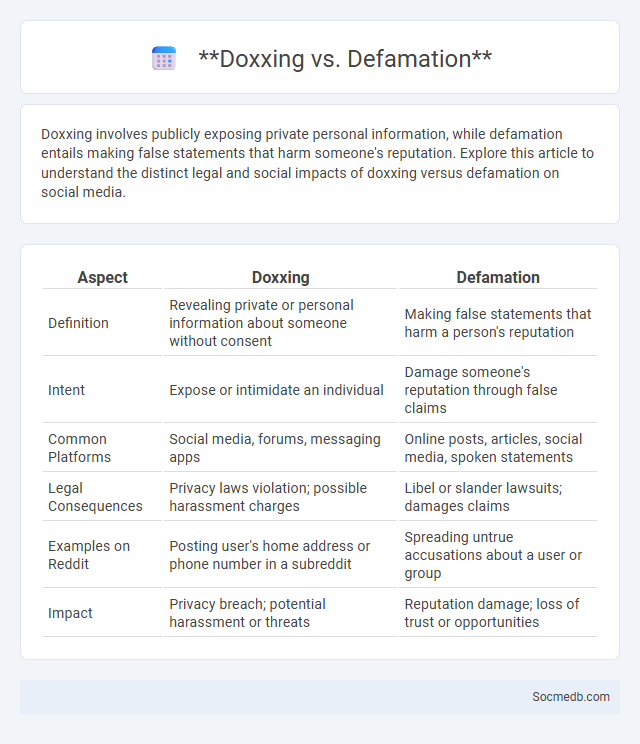
Photo illustration: doxxing vs defamation
Doxxing involves publicly exposing private personal information, while defamation entails making false statements that harm someone's reputation. Explore this article to understand the distinct legal and social impacts of doxxing versus defamation on social media.
Table of Comparison
| Aspect | Doxxing | Defamation |
|---|---|---|
| Definition | Revealing private or personal information about someone without consent | Making false statements that harm a person's reputation |
| Intent | Expose or intimidate an individual | Damage someone's reputation through false claims |
| Common Platforms | Social media, forums, messaging apps | Online posts, articles, social media, spoken statements |
| Legal Consequences | Privacy laws violation; possible harassment charges | Libel or slander lawsuits; damages claims |
| Examples on Reddit | Posting user's home address or phone number in a subreddit | Spreading untrue accusations about a user or group |
| Impact | Privacy breach; potential harassment or threats | Reputation damage; loss of trust or opportunities |
Understanding Doxxing: Definition and Scope
Doxxing involves the malicious act of publicly revealing someone's private information, such as home address, phone number, or financial details, without their consent to intimidate or harass. Understanding the scope of doxxing is crucial as it affects your online privacy and safety across various social media platforms where personal data can be exploited. Recognizing tactics used in doxxing empowers you to protect your information and maintain control over your digital footprint.
What Is Defamation? Legal Overview
Defamation involves making false statements that harm another person's reputation, either spoken (slander) or written (libel), especially relevant on social media platforms where content spreads rapidly. Understanding your rights and the legal standards for proving defamation, such as falsity, publication to a third party, and demonstrable harm, is crucial in protecting your online presence. Social media users must be aware that sharing damaging falsehoods can lead to significant legal consequences under defamation law.
Personal Information Doxxing Explained
Personal information doxxing involves the malicious act of publicly exposing private details such as home addresses, phone numbers, or financial data on social media platforms without consent. This cyber threat compromises individual privacy, leading to harassment, identity theft, or physical danger. Understanding doxxing mechanisms and implementing strong privacy settings can help users safeguard their sensitive data from malicious actors online.
Key Differences: Doxxing vs Defamation
Doxxing involves publicly revealing someone's private information, such as home address or phone number, without consent, often leading to privacy invasion and potential harm. Defamation refers to making false statements that damage a person's reputation, which can result in legal consequences for libel or slander. Protecting your online identity requires understanding that doxxing attacks your privacy, while defamation targets your character.
Similarities Between Doxxing and Defamation
Doxxing and defamation both involve the malicious exposure of personal information aimed at harming an individual's reputation online. These actions violate privacy and can lead to severe emotional distress, impacting Your digital presence and personal safety. Both practices are often governed by legal repercussions, highlighting the importance of safeguarding sensitive data on social media platforms.
Legal Consequences: Doxxing, Defamation, and Personal Info Exposure
Legal consequences of social media misuse include doxxing, defamation, and unauthorized exposure of personal information, which can result in criminal charges, civil lawsuits, and financial penalties. Doxxing involves maliciously sharing private details, violating privacy laws and leading to harassment or threats. Defamation through false statements harms reputations and enables victims to seek damages under libel and slander laws, emphasizing the need for responsible online behavior.
Examples of Doxxing, Defamation, and Personal Information Doxxing
Examples of doxxing include publicly sharing an individual's home address, phone number, or workplace without consent, often leading to harassment or threats. Defamation on social media involves posting false statements that damage a person's reputation, such as spreading unverified rumors or fabricated accusations. Personal information doxxing specifically targets sensitive data like social security numbers, financial details, or private emails, increasing risks of identity theft and privacy breaches.
Protecting Yourself Against Doxxing and Defamation
Safeguarding your personal information on social media is crucial to protect yourself against doxxing and defamation. Utilize strict privacy settings, avoid sharing sensitive details, and regularly audit your online presence to minimize exposure. You can also report defamatory content promptly and engage legal support if necessary to defend your digital reputation effectively.
Reporting and Responding to Online Harassment
Effective reporting and responding to online harassment involves using platform-specific tools to flag abusive content and ensure swift action from moderators. Victims can document incidents through screenshots and detailed records to support formal complaints with social media companies or law enforcement agencies. Implementing clear community guidelines and AI-driven monitoring systems enhances detection and reduces the prevalence of online harassment.
Prevention Strategies and Digital Privacy Tips
Implementing robust prevention strategies against social media threats includes regularly updating privacy settings, using strong, unique passwords, and enabling two-factor authentication to protect digital identities. Limiting personal information sharing, scrutinizing app permissions, and avoiding suspicious links reduce exposure to cyber-attacks and data breaches. Educating users on recognizing phishing attempts and configuring social media accounts for maximum privacy fosters safer online interactions and preserves digital privacy.
 socmedb.com
socmedb.com